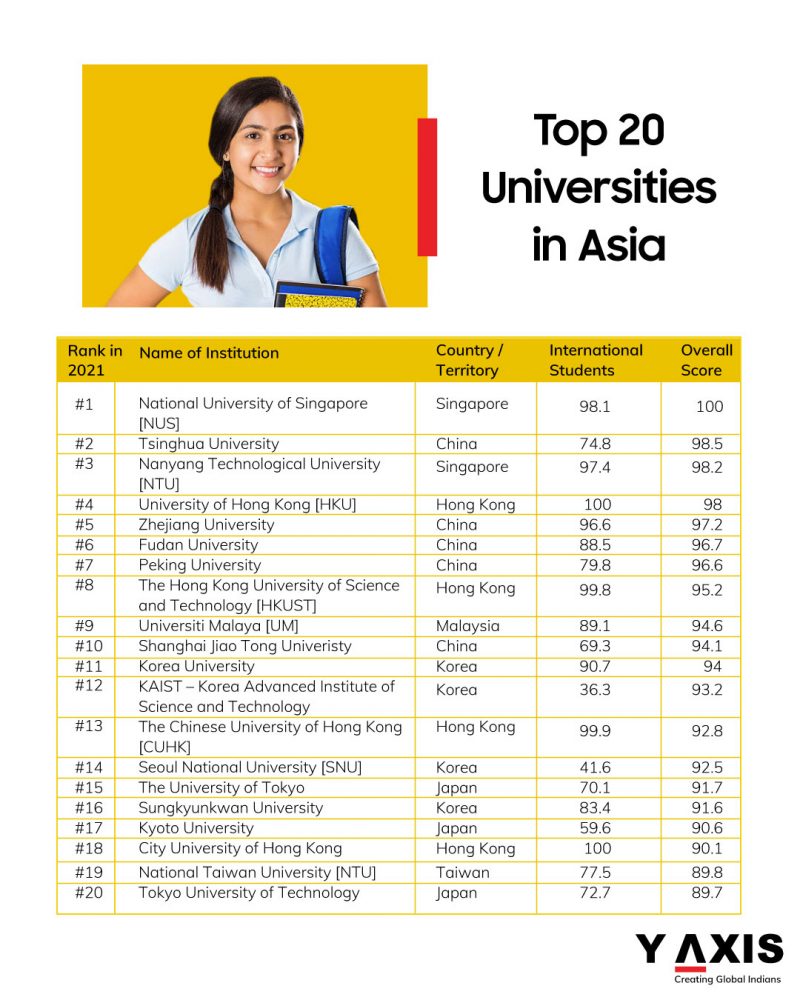Posted on November 28 2020
Which are the Top 20 universities in the Asian region?
By , Editor
Updated April 03 2023

The 2021 QS World University Rankings [Asia] have recently been announced, highlighting the level of diversity of institutions within the Asia region.
One of the most sought-after rankings of universities globally, the findings of the report reveal that there is “a high amount of opportunity and choice for students both within and outside the region when considering an Asian-based education”.
QS – Quacquarelli Symonds – is the leading provider of analytics, services as well as insight into the higher education sector worldwide.
Inaugurated in 2004, the QS World University Rankings portfolio has progressed to become the most trusted and popular source of comparative data about the performance of various universities at the international level.
The QS World University Rankings: Asia, on the other hand, have been published since 2009. In addition to retaining the key indicators of global ranking – such as, Faculty to Student Ratio, Employer Reputation, and Academic Reputation – a set of performance metrics specifically tailored for the region have also been taken into consideration.
According to Dr Andrew MacFarlane, Rankings Manager, QS Quacquarelli Symonds, “In what has been a challenging year for the higher education sector across the globe, the level of engagement we have seen from institutions in the Asia region has been tremendously encouraging.”
Striving to represent universities across the world, the Report has been able to rank 650 educational institutions in the Asian region this year, up from the 550 ranked in the previous year.
Top 20 universities in Asia
The metrics assessed in the 2021 QS World University Rankings [Asia] are –
| Academic reputation |
| Employer reputation |
| Faculty to student ratio |
| Staff with PhD |
| Papers per Faculty |
| Citations per paper |
| International research network |
| International faculty |
| International students |
| Inbound exchange |
| Outbound exchange |
The maximum weightage [30%] is given to the Academic Reputation of the institution, taken from the annual survey conducted by QS for the evaluation of the “perceptions of academics from around the world regarding the best institutions in terms of research”.
Among the other metrics evaluated, by “International Students” is implied the proportion of international students at the institution.
| Rank in 2021 | Name of Institution | Country / Territory | Academic Reputation | International Students | Overall Score |
| #1 | National University of Singapore [NUS] | Singapore | 100 | 98.1 | 100 |
| #2 | Tsinghua University | China | 100 | 74.8 | 98.5 |
| #3 | Nanyang Technological University [NTU] | Singapore | 99 | 97.4 | 98.2 |
| #4 | University of Hong Kong [HKU] | Hong Kong | 100 | 100 | 98 |
| #5 | Zhejiang University | China | 93 | 96.6 | 97.2 |
| #6 | Fudan University | China | 99 | 88.5 | 96.7 |
| #7 | Peking University | China | 100 | 79.8 | 96.6 |
| #8 | The Hong Kong University of Science and Technology [HKUST] | Hong Kong | 99 | 99.8 | 95.2 |
| #9 | Universiti Malaya [UM] | Malaysia | 92 | 89.1 | 94.6 |
| #10 | Shanghai Jiao Tong Univeristy | China | 98 | 69.3 | 94.1 |
| #11 | Korea University | Korea | 95 | 90.7 | 94 |
| #12 | KAIST – Korea Advanced Institute of Science and Technology | Korea | 99 | 36.3 | 93.2 |
| #13 | The Chinese University of Hong Kong [CUHK] | Hong Kong | 99 | 99.9 | 92.8 |
| #14 | Seoul National University [SNU] | Korea | 100 | 41.6 | 92.5 |
| #15 | The University of Tokyo | Japan | 100 | 70.1 | 91.7 |
| #16 | Sungkyunkwan University | Korea | 88 | 83.4 | 91.6 |
| #17 | Kyoto University | Japan | 100 | 59.6 | 90.6 |
| #18 | City University of Hong Kong | Hong Kong | 88 | 100 | 90.1 |
| #19 | National Taiwan University [NTU] | Taiwan | 100 | 77.5 | 89.8 |
| #20 | Tokyo University of Technology | Japan | 95 | 72.7 | 89.7 |
A hard-earned metric, reputation takes time to build as well as effort to nurture.
Institutions that score well on the metrics of reputation have well-rounded faculty offerings, well-established global partnership, along with a strong culture of research.
The annual QS Global Employer Survey looks at skills that are of the most importance to employers in the Asian region. It was found that the skills most in demand with employers in Asia were – problem-solving, teamwork and communication.
According to the 2021 QS World University Rankings [Asia], “In our 2020 Pulse survey, 60 percent of employers said that flexibility and adaptability of graduates have become even more relevant due to the ongoing pandemic. It is paramount that institutions prepare their students for the realities of the global workplace. By ensuring that work experience is woven into the fabric of their education, as well as integrating these soft skills into the learning experience, institutions will be supporting their students’ futures in the region and beyond.”
If you are looking to Work, Study, Invest, Visit, or Migrate to Canada, talk to Y-Axis, the World’s No. 1 Immigration & Visa Company.
If you found this blog engaging, you may also like …
Interested in study abroad? Y-Axis can help you with your visa
Tags:
Share
Options for you by Y-Axis
Get it on your mobile
Get News alerts
Contact Y-Axis

